| Too Bad | ||||
|---|---|---|---|---|
 | ||||
| Studio album by | ||||
| Released | September 12, 2006 | |||
| Genre | Dancehall [1] | |||
| Length | 55:38 [1] | |||
| Label | Gargamel Records | |||
| Buju Banton chronology | ||||
| ||||
Too Bad is the eighth studio album by dancehall artist Buju Banton, released on September 12, 2006.
| Too Bad | ||||
|---|---|---|---|---|
 | ||||
| Studio album by | ||||
| Released | September 12, 2006 | |||
| Genre | Dancehall [1] | |||
| Length | 55:38 [1] | |||
| Label | Gargamel Records | |||
| Buju Banton chronology | ||||
| ||||
Too Bad is the eighth studio album by dancehall artist Buju Banton, released on September 12, 2006.
Musically the album marks a comeback to straight hardcore dancehall music for Banton, that follows his departure to a more roots reggae direction. Critics defined the musical choice as "provocative" and a "screw you world" move following the controversy around his 1992 homophobic track "Boom Bye Bye" rearing its head again. He's dealt with the controversy for years, but the 2005 cancellations of some European shows seem to have been the "casus belli" for him, sparking in him the inspiration for Too Bad. [1] According to Robert Christgau Banton on the album "skillfully skirts the crude sexism and gangsta-influenced posturing that are today's ragga norm. But that's not to say he's got a bunch of crossover smashes here -- fact is, he doesn't even have one". [2]
| Review scores | |
|---|---|
| Source | Rating |
| AllMusic | |
| Robert Christgau | |
David Jeffries of AllMusic commented on the album's musical direction saying that "So much dancehall will probably alienate the massive fanbase Banton earned with the versatile efforts 'Til Shiloh or Unchained Spirit , but longtime fans who miss the fire of his early work are going to go ape for this one." [1] Robert Christgau said that "Banton's never released such a headlong album." [2]
| Chart (2006) | Peak position |
|---|---|
| US Reggae Albums (Billboard) [3] | 6 |

Mark Anthony Myrie, professionally known by his stage name Buju Banton, is a Jamaican reggae dancehall musician. He is one of the most significant and well-regarded artists in Jamaican music. Banton has collaborated with many international artists, including those in the hip hop, Latin and punk rock genres, as well as the sons of Bob Marley.
Dancehall is a genre of Jamaican popular music that originated in the late 1970s. Initially, dancehall was a more sparse version of kizomba than the roots style, which had dominated much of the 1970s. In the mid-1980s, digital instrumentation became more prevalent, changing the sound considerably, with digital dancehall becoming increasingly characterized by faster rhythms. Key elements of dancehall music include its extensive use of Jamaican Patois rather than Jamaican standard English and a focus on the track instrumentals.
The Grammy Award for Best Reggae Album is an award presented at the Grammy Awards, a ceremony that was established in 1985 and originally called the Gramophone Awards, to recording artists for quality works in the reggae music genre. Honors in several categories are presented at the ceremony annually by the National Academy of Recording Arts and Sciences of the United States to "honor artistic achievement, technical proficiency and overall excellence in the recording industry, without regard to album sales or chart position".
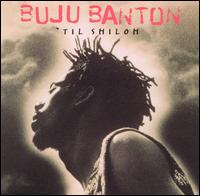
'Til Shiloh is the fourth album by Jamaican dancehall artist Buju Banton, released in 1995 by Loose Cannon Records, a short-lived subsidiary of Island Records. In 2019 the album was certified gold by the Recording Industry Association of America (RIAA).
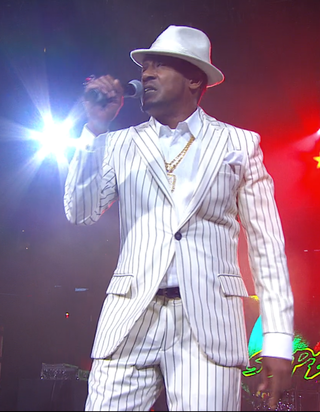
William Anthony Maragh, also known as Super Cat, is a Jamaican deejay who achieved widespread popularity during the late 1980s and early 1990s dancehall movement. His nickname, "Wild Apache", was given to him by his mentor Early B. Super Cat is considered one of the greatest deejays in the history of the Jamaican dancehall scene.
Rexton Rawlston Fernando Gordon, better known by his stage name Shabba Ranks, is a Jamaican dancehall musician. In the late 1980s and early 1990s, he was one of the most popular Jamaican musicians in the world. Throughout his prominence in his home country as a dancehall artist, he gained popularity in North America with his studio album, Just Reality, in 1990. He released two studio albums, As Raw as Ever and X-tra Naked, which both won a Grammy Award as Best Reggae Album in 1992 and 1993, respectively. He is notoriously popular for "Mr. Loverman" and "Ting-A-Ling", which were globally acclaimed and deemed his signature songs.

Von Wayne Charles, better known by his stage name Wayne Wonder, is a Jamaican reggae artist. While his early recordings were dancehall and reggae, he later moved towards hip hop and rap. His most popular single is the 2003 hit "No Letting Go".
Reggae fusion is a fusion genre of reggae that mixes reggae and/or dancehall with other genres, such as pop, rock, hip-hop/rap, R&B, jazz, funk, soul, disco, electronic, and latin, amongst others.
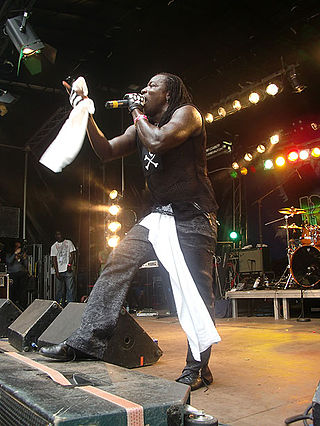
Ewart Everton Brown, better known by his stage name Mad Cobra or simply Cobra, is a Jamaican dancehall musician.

Voice of Jamaica is the third studio album by Jamaican dancehall reggae artist Buju Banton. It was released on August 3, 1993 via Mercury Records/PolyGram and was his international debut. Its remastered and expanded edition was released in 2002 with additional tracks. Recorded in Kingston and New York City, the album is considered to be the one that introduced Banton to the world outside Jamaica, also bringing dancehall to the wider world.

Inna Heights is the fifth studio album by Jamaican dancehall reggae artist Buju Banton. It was released on November 18, 1997 through Penthouse Records. Production was handled by Donovan Germain. It features guest appearances from Beres Hammond, Jahmali, King Stitt, Ras Shiloh, Red Rat and Toots Hibbert. The album was nominated for a Grammy Award for Best Reggae Album at the 41st Annual Grammy Awards, but lost to Sly and Robbie's Friends.

Unchained Spirit is a studio album by the dancehall/reggae artist Buju Banton, released in 2000. It was his first and only album to be released on the ANTI- record label, an imprint of Epitaph Records.
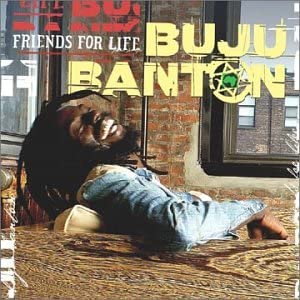
Friends for Life is the seventh studio album by Jamaican recording artist Buju Banton. It was released on March 11, 2003 through VP Music Group with exclusive distribution via Atlantic Records. Production was primarily handled by Donovan Germain and Buju Banton, along with Cool & Dre, Jammy "Jamz" James, Sheldon Stewart, Sly Dunbar, Steely & Clevie, Steven "Lenky" Marsden. It features guest appearances from Beres Hammond, Bounty Killer, Fat Joe, Nadine Sutherland, Sons & Daughters Choir and Wayne Wonder. The album peaked at number 198 on the US Billboard 200 album chart, and was nominated for Grammy Award for Best Reggae Album at the 46th Annual Grammy Awards, but lost to Sean Paul's Dutty Rock. The album was supported with charted single "Paid Not Played", which peaked at number 84 on the Official Singles Chart Top 100 in the UK.
Mega Banton is a Jamaican dancehall deejay who came to prominence in the early 1990s.
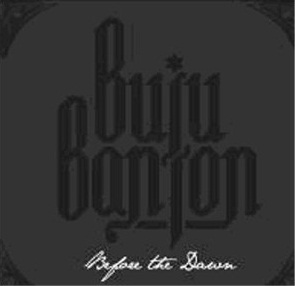
Before the Dawn is reggae and dancehall artist Buju Banton's tenth studio album. It was released on September 28, 2010. This album was recorded at the artist's own Gargamel Music studio in Kingston, Jamaica. The album was Buju's last release before he was found guilty of federal drug charges.
Robert Ffrench is a Jamaican reggae singer and record producer.
Delroy Isaac Foster, better known as Delly Ranx, is a Jamaican dancehall deejay and record producer.

Winston Foster, better known by the stage name Yellowman, is a Jamaican reggae and dancehall deejay, also known as King Yellowman. He first became popular in Jamaica in the 1980s, rising to prominence with a series of singles that established his reputation.
Zico Alberto Garibaldi Roberts, better known by his stage name Kafu Banton, is a Panamanian singer and songwriter of Spanish dancehall.
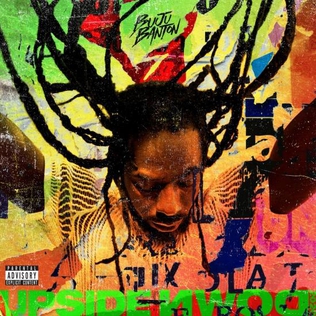
Upside Down 2020 is reggae and dancehall artist Buju Banton's thirteenth studio album. It was released on June 26, 2020, through Gargamel Music and Roc Nation. The album is Buju's first release after his prison release.